Australian Red Cross Board
The members of the Board are the key policy-makers of Australian Red Cross.
The Board of Australian Red Cross governs the organisation’s activities and ensures it acts in accordance with the Geneva Convention, the International Committee of the Red Cross (ICRC) regulations, the international movement’s protocols, and the fundamental principles of the international Red Cross and Red Crescent movement. The Board also develops and maintains ethical standards.
Comprising up to 16 members, the Board includes the President, Deputy President, the Audit and Risk Committee Chair, the Youth Member, the Chair or nominee of each of the eight Divisional Advisory Boards from each state and territory, the Australian Red Cross Lifeblood Chair and up to three Additional Board Members. While they are not members of the Board, Australian Red Cross’ CEO, Chief Financial Officer and General Counsel & Society Secretary attend Board meetings.
Our Board Members are volunteers who receive no payment for their services, other than reimbursement for reasonable travel and other expenses incurred through their work for Australian Red Cross. The Australian Red Cross Lifeblood Chair member receives payment from Lifeblood.
Ensuring good governance is a key Board responsibility. This includes overseeing mechanisms to comply with legal requirements and regulations, ensuring the ongoing financial viability of Australian Red Cross. The Board monitors and periodically evaluates its own performance and strives to always have a skilled and diverse membership in place. It also establishes and implements a recognition process that acknowledges the efforts of volunteers, members and employees.
Board members

When Charles Burkitt was two, Cyclone Tracy ripped through his hometown of Darwin in the early hours of Christmas Day leaving complete destruction while killing 71 people.
Charles, along with his parents and four-year-old brother, sheltered under their house, then when over half the city’s population was evacuated in the days after the storm, the family decided to stay together in Darwin for the clean-up.
Red Cross assisted in that evacuation of over 30,000 people, many of them women and children. Red Cross also helped amid the rebuild.
“I think staying in Darwin was the right decision for us because those who left either never returned, or found it really difficult when they finally returned to a city they no longer recognised,” Charles says.
After that event Red Cross never really left Charles’ life.
His mother was a volunteer and then joined the staff and stayed for 30 years, during which she set up the Home Care Service, among other things. The family also lived next door to Red Cross’ Northern Territory headquarters in Lambell Terrace, Darwin.
“As a kid I’d go door knocking with Mum collecting donations, and even dress up as a blood drop to help promote the Blood Bank,” Charles laughs.
As a teenager he went to boarding school in Sydney but then returned home to launch his career as an Investment Adviser.
Charles now works in commercial property and as a corporate advisor.
He has been a member of the Australian Red Cross national board since 2014 when he was elected chair of the Northern Territory Division. He was then elected to the Deputy President's position in 2019.
“The beauty of Red Cross is there’s no agenda, we’re there to help people in times of need and to build on community strengths.”
“Our neutrality and impartiality are very important but so is being sustainable, so we can deliver services and positive social outcomes, that’s primarily where my interest lies.”
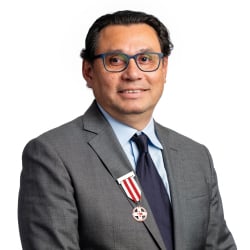
Sam Hardjono was keenly observant growing up in Indonesia, the son of a pioneering Australian academic mum and an Indonesian engineer dad.
From his family’s home in the regional capital, Bundung, he witnessed chronic poverty and the shocking devastation wrought by natural disasters.
“I distinctly remember floodwaters reaching one to two metres,” he says.
“I was sitting on a fence watching military green Land Rovers with a big Red Cross on them, full of people, driving through the water.”
“In my mind Red Cross equalled help and Indonesia went through so many different catastrophes that help was critical.”
He joined the NSW Divisional Advisory Board of Red Cross in 2010 and was elected DAB Chair in 2015. It was one of several significant achievements in an extensive career leading organisations in the not-for-profit and private sectors.
Sam is currently a senior strategic adviser and board director, he has an MBA and works with the corporate, not-for-profit and start-up sectors.
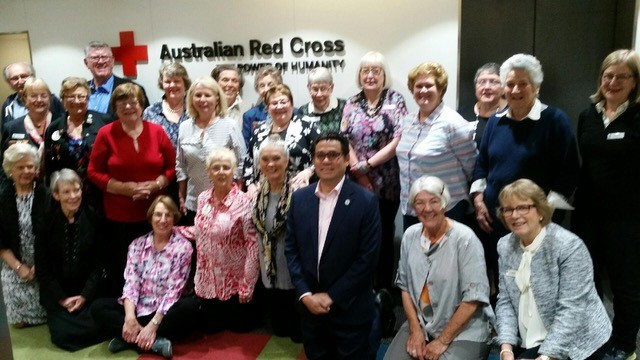
“My heart is with the members and volunteers of Australian Red Cross because they’re at the very front of Red Cross work,” he says.
“For a hundred years they have been at the cutting edge of understanding problems and trying to find solutions.”
Sam took the reins of the Audit and Risk Committee in 2020 when Kym Pfitzner, who held the role, was appointed CEO of Australian Red Cross.
“Once you volunteer for this organisation it gets under your skin and becomes part of your life. I’ve never felt a greater sense of community than I have within Red Cross.”
Sam went to school in Sydney, where a summer job in an accountant’s office led to tertiary study in the same field and a then full-blown career in corporate leadership.
“Technically I’ve been accounting since I was a teenager,” he quips.
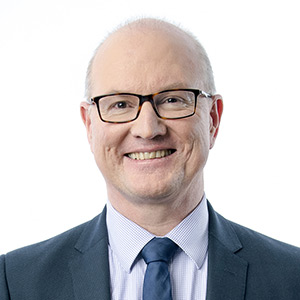
James Birch’s stellar career in health management culminated in the role of Global Health Care Leader for Ernst & Young, which he held until 2016.
Prior to that position James ran South Australia’s Human Services and Health Department, was deputy of South Australia’s Justice Department and Chief Executive of major health service delivery organisations, including academic teaching hospitals.
But when asked what part of his work really fired his enthusiasm, James nominates infant health and wellbeing.
“I got exposed really early to the disadvantage children can suffer if they don’t have opportunities early in life,” he says.
“The jury is no longer out, the science is very strong. So, if my professional career has been dominated by one passion, it’s the need to ensure all children, particularly those from disadvantaged backgrounds, have the opportunity to reach their full potential.”
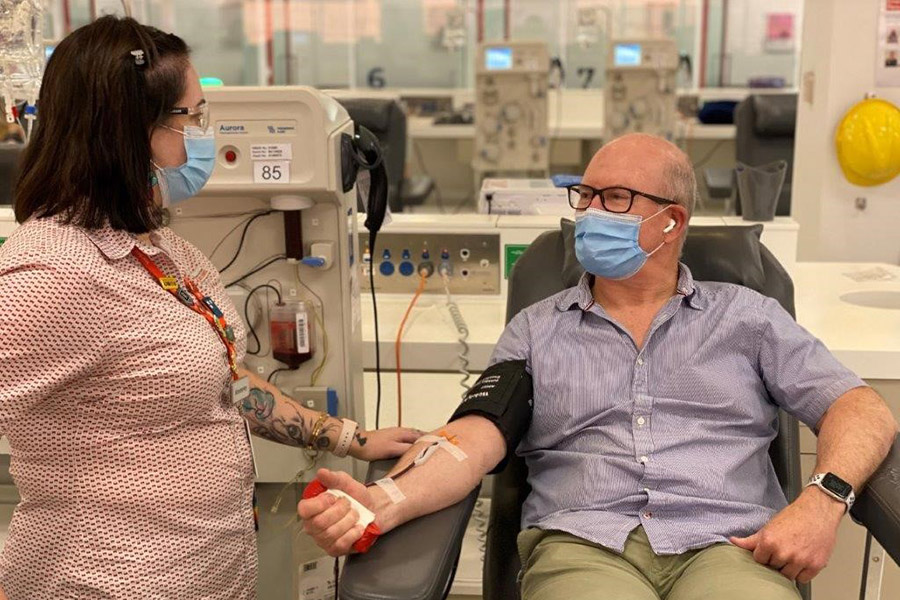
As Chair of SA’s Women’s and Children’s hospital, he is able to steer service delivery and policy in this area.
As chair of Red Cross’s Lifeblood Division, James came to sit on Red Cross’s national board.
“Lifeblood is one of the most spectacular organisations I’ve ever had anything to do with,” he says.
“Lifeblood produces a life giving set of products and if you come out of health like I do you can’t not be passionate about that.”
On the Humanitarian side of Red Cross James is passionate about disasters and migration services.
“No-one else does it better and I expect society thinks that to,” he says.
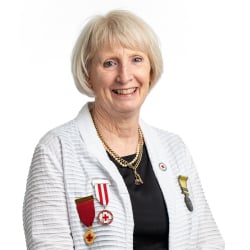
Helen joined Australian Red Cross nearly 20 years ago and has been an active member and volunteer involved in branch fundraising. In 2022 Helen was elected as the Chair of the Queensland Divisional Advisory Board, after joining the Queensland Divisional Advisory Board in 2016, being elected Deputy Chair in 2018.
Helen is a dedicated volunteer who has served in several programs, including the Brisbane Night Café for 13 years. The cafe provides practical support to young people facing homelessness. Additionally, Helen has been involved in every emergency impacting south Queensland since 2011, including acting as a COVID phone volunteer for many months.
Helen has served as a member of the National Awards Committee, Queensland Awards Committee and Queensland IHL Dissemination Committee.
Helen has also volunteered in different positions, including executive roles, in a range of community organisations, including school P&Cs, Meals on Wheels, Jubilee Community Care, the Mentally Handicapped Association Hong Kong, and church councils. Helen has also served as a Justice of the Peace for 48 years.

Prior to be appointed as Youth Board Member in December 2022, Ané was Chair of the New South Wales Youth Advisory Committee.
Ané is the founder and CEO of Young Women in Sustainable Development, which is an organisation that addresses the barriers preventing young women from taking action on some of the world’s most pressing issues (SDGs) and amplifies their voices in every aspect of international development from policy to implementation. She has attended multiple high-level international negotiations on international developmental issues including the 2019 United Nations Climate Action Summit. She has also served as the Australia Country Coordinator to the 16th and 17th United Nations Youth Climate Change Conferences in 2021 and 2022.
Additionally, she led the creation of the first ever official Australian Youth Statement and Policy Recommendations to be submitted to the United Nations Framework Convention on Climate Change as part of official negotiations at COP26 in October 2021. She has also worked with the UN Global Compact on the Business Ambition for 1.5 Climate Campaign.
Ané holds a Bachelor of Media (Public Relations and Advertising) from the University of New South Wales and a Master of Commerce (Marketing and International Business) from the University of Sydney. She has also been listed as a Young Woman to Watch by Young Australians in International Affairs in 2021 and received the University of Sydney Women’s College Community Impact Award in 2022.
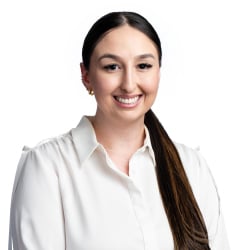
Nazli has been heavily involved in volunteer work in the youth sector and was the recipient of a Certificate of Commendation for Service to the Community in 2012. She continues to be an active member of a number of NSW based youth organisations.
Nazli previously worked for one of the leading human rights and pro bono programs in Australia, working on landmark human rights cases focused on racially and culturally fuelled discrimination.
She is the Company Secretary and Governance Advisory for Skyjed Pty Ltd.
Nazli provides legal and governance oversight to AI and machine learning companies, Dynamic Crowd Measurement Pty Ltd, Assess Threat Pty Ltd and Showsec Pty Ltd.
She is also engaged as the Head of ESG and Legal Advisory for the diverse services company ACESGroup.
Nazli holds a Master of Laws in Human Rights Law, Graduate Diploma in International Law and Graduate Certificate in International Dispute Resolution from the University of London, Graduate Diploma in Legal Practice from the College of Law, as well as Bachelor of International Studies and Bachelor of Laws from Western Sydney University.

Tarn joined Australian Red Cross in 2016, and since then has held roles across Community Programs and Emergency Services.
In 2020, Tarn was appointed as the Youth Member of the Northern Territory Divisional Advisory Board, and then as Deputy Chair in 2022.
Tarn’s experience in the community sector has spanned the fields of community development, advocacy and counselling. Throughout her career, Tarn has worked alongside women and young people in Central Australia to pursue social justice and community connectedness.
Tarn’s qualifications include a Masters of Narrative Therapy and Community Work, Bachelor of Social Work (Hons) and Bachelor of Arts (Philosophy). Tarn is a member of the Australian Institute of Company Directors.
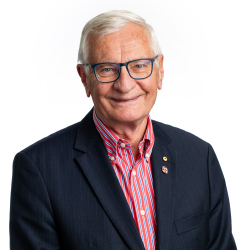
While volunteering with Red Cross in the Whittlesea community in the days after the 2009 Victorian bushfires, Garry Nolan encountered a small boy and his parents at the emergency evacuation centre.
The four-year-old was sobbing amid hundreds of distressed evacuees, exhausted firefighters and volunteers.
Garry asked if he could help and the boy’s mother explained he’d lost all his toys.
Amid the coming and going, Garry managed to find him a trauma teddy, one of the soft toys Red Cross volunteers have been knitting for children since 1990.
It was a modest gesture in the wake of one of Victoria’s most devastating natural disasters.
“He walked away glowing with joy. It was just gorgeous,” Garry says.
“Our ability to support people in distress is one of many reasons I am passionate about Red Cross. It is the glue keeping society together.”
Garry joined Red Cross in 2007 after he retired from National Australia Bank.
“Banks at that time made a highly valuable contribution to Australia’s economic and community development. Sadly, they lost their way, but it is reassuring to see them supporting Australians through this global pandemic” Garry says.
Garry’s final role at NAB was as Group Company Secretary & Chief Governance Officer where he contributed to the Best Practice Governance Recommendations for companies listed on the Australian, London and New York stock exchanges.
Governance remains a passion. “As a boy, I pulled a mechanical watch apart to see how it worked. I put it back together and to this day, I love it when everything works together to achieve the desired result. Without good governance practices, the sustainability of any organisation is at considerable risk.
Garry was elected Chair of Victoria’s DAB in 2020 after six years as deputy.
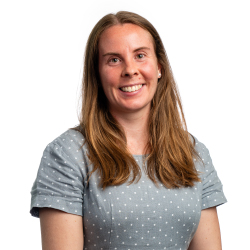
Melanie joined Australian Red Cross in 2017 and has since then focused on initiatives aimed at transforming youth participation at Red Cross. In October 2022, Melanie was appointed as Chair of the Tasmanian Divisional Advisory Board. Previously she held roles as a member of the Tasmanian Divisional Advisory Board, and Tasmanian Youth Advisory Committee (the latter of which she was also chair).
Melanie, who was admitted as a legal practitioner in 2015, is a legislative drafter with the Tasmanian Office of Parliamentary Counsel. Prior to this, Melanie was a specialist family violence prosecutor for Tasmania Police. This opportunity gave her substantial insight into the criminal justice system and the issue of family and domestic violence, both topics about which she remains passionate.
Outside Australian Red Cross, Melanie has been involved in different community organisations at all levels including the model United Nations and youth parliament camps.
Melanie holds a Bachelor of Arts, Bachelor of Laws and first-class Honours degree in Sociology.
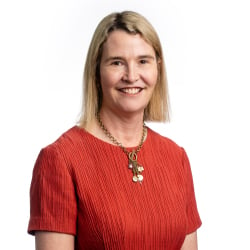
Elizabeth (Liz) was appointed to the Board of Australian Red Cross in April 2023, following serving as an independent member of the Finance Committee since 2020.
Liz was also appointed Chair of the Finance Committee on 25 September 2023, and is a member of the Audit and Risk Committee.
Liz is an experienced non-executive director and committee chair, including on ASX listed companies. Her executive career includes Corporate Finance Partner roles at William Buck and Grant Thornton, as well as audit experience at Ernst & Young. Liz has strong skills in finance and accounting, strategy, risk, and governance. She has worked across a broad range of sectors, including for large, membership-based organisations.
Liz holds a Bachelor of Commerce from the University of Melbourne and a Masters of Business Administration from La Trobe University. She is a Fellow of Chartered Accountants Australia and New Zealand, a Fellow of the Financial Services Institute of Australasia, a Fellow of the Governance Institute and is a graduate of the Australian Institute of Company Directors.
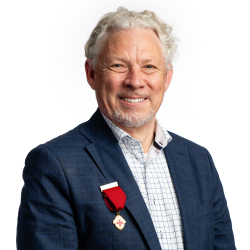
Keith was elected to the South Australia Divisional Advisory Board in 2016, appointed as Deputy Chair in 2019 and Chair in October 2021. Keith was appointed as a member of the Society’s Board in September 2022.
From 2006, Keith served on the South Australian International Humanitarian Law (IHL) Committee.
Experience in international law, disarmament and non-proliferation fields has led Keith to involvement in delivering training and capacity-building programs on international trade law and policy, development assistance, security and disarmament, regulation, governance, human rights, and other issues in more than 40 countries including in Australia, Africa, Europe, Asia, and the Pacific Islands.
Most recently, Keith was a Senior International Trade Law Counsellor at the Institute for International Trade at the University of Adelaide. Keith has held previous positions in the private sector and legal practice, as well as in the Commonwealth Attorney-General’s Department, international organisations and in the Australian tertiary sector. He was the inaugural IIT Visiting Fellow at the World Trade Organisation in Geneva between 2015-2016.
He has been involved in negotiations on a range of international treaties, arrangements, and dispute settlements, and with many international and regional bodies and committees. Keith has also taught in undergraduate and postgraduate university programs in international trade, law, and disarmament.
This page was updated 17 July 2024.